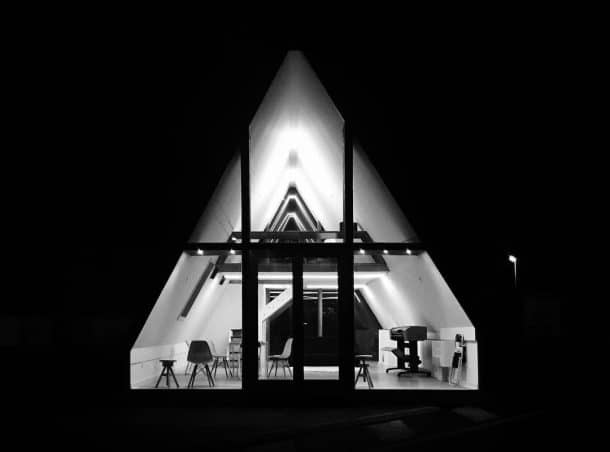Architecture seems to be getting more and more futuristic with every passing day. From homes that can be ordered through Amazon, to Bio-houses, moving sai-bridges and natural sky-scrapers. Architects have surely gone a long way with the architecture development. In the latest development, the Italian architect Renato Vidal has developed a foldable house which is earthquake-proof. This foldable house comes prefabricated and takes less than a day to be installed.
Known as M.A.Di home, this A-shaped house can be folded down to completely flat making it super easy and economical to ship. These homes are built specifically to withstand earthquakes using cross-laminated timber, also called CLT.

The house comes in many sizes including a 27-sq m tiny home, a 46-sq m or 56-sq m double home, a 70 sq m or 84 sq m triple family house. At all sizes these homes come with two levels, a kitchen, a dining area, a bathroom, and bedroom(s). The tiny module costs US$25,195 while the triple family house costs US$67,200. Compare that to the average cost of buying a new home in the USA which in October 2017 was estimated to be $400,200.
The Italian wood specialist, Domenico Antonucci from Area Legno, who manufactures the M.A.Di said, “Thanks to the home’s steel profile and steel hinges we can open and close this module with ease. When the module is closed and folded for transportation the packed height measures 1.5 m (4.9 ft), and then when it is opened on site, it has a height of 6.5 m (21.3 ft).”
As the urban areas continue to grow and economic struggles are also growing equally, the housing like M.A.Di could be the future of homes. It doesn’t require a ground-level foundation, the house can be a temporary or permanent structure which can be folded and moved easily. This house folds so neatly and compactly that it can even be folded and kept in the storage as an emergency housing system. Modules can be joined together easily so the owners of these homes could grow the space of the house with their families.
As our world grows and changes constantly, so do the requirements we have from our housing system. Many other and this futuristic housing are a perfect solution to the changing housing narrative.


